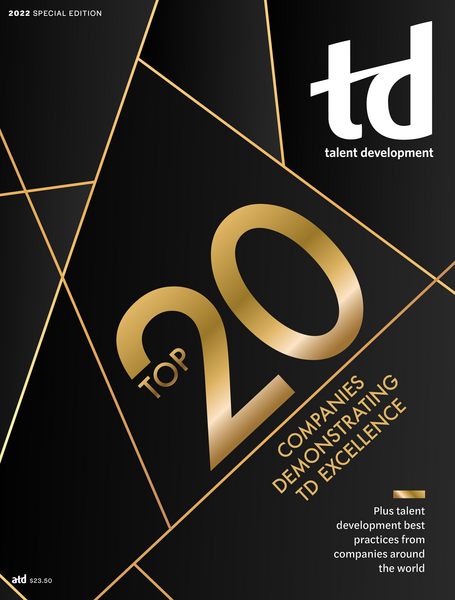TD Magazine Article
Member Benefit
New, Not Novice
Companies are developing sophisticated onboarding programs for better business.
Wed Jun 15 2022

Recruiting great talent in today's competitive economy isn't easy, and ensuring new hires remain on the job and productive for years to come can be equally, if not more, challenging. With companies struggling to hire and retain the best talent in a post-COVID-19 environment, onboarding is gaining new significance in corporate culture. Here's how three companies are demonstrating excellence in practice.
In 2017, Cruise, a manufacturer of self-driving cars, began a period of hypergrowth that saw the firm doubling in size year over year for three consecutive years with the addition of 30–60 new employees every two weeks. The need to develop programs to assimilate all the new hires into this aggressive growth strategy became paramount. So, the company developed a three-pronged onboarding program—Ignition, New Hire Curriculum, and Liftoff—that provides clarity about Cruise's structure, history, mission, culture, and strategy.
Expansion also led Cognizant to roll out new onboarding offerings. For the technology services and consulting company, expansion had to do with services. Among the most significant challenges in the medical device industry is developing a workforce well equipped to handle complaints. In 2015, Cognizant, which employs a robust division devoted to tech support, decided to offer complaint management services to medical device manufacturers and began hiring new college graduates with life science degrees to fill the role. But because academia does not teach students specifically about the medical device industry, its regulations, and the complaint management process, the availability of ready-to-deploy talent was sparse. Consequently, the company's life science digital business operations unit decided to launch its groundbreaking Medical Device Complaints Management Bootcamp, which aimed in part to "supercharge" its medical device complaint management recruits.
At SAP, a multinational software corporation, a massive influx of new account executives in recent years warranted more sophisticated and company-wide onboarding procedures. "Onboarding became a major priority due to SAP's rapid growth over the past six years," says Manuel Villa Delgado, vice president of global customer operations sales learning. "It was crucial that \[the new hires\] receive a consistent onboarding experience that included role-specific customization."
To that end, the L&D team developed a 90-day, blended learning global onboarding program to help new sales hires become productive more quickly. Since enacting the program in 2015, SAP has trained thousands of new associates and has extended the program beyond their first 90 days of employment to cover their entire first year with the company.
Big benefits
These three innovative companies are unrelated in terms of business mission, but each has demonstrated a commitment to making the earliest days of a new employee's tenure matter. Their comprehensive onboarding initiatives use a mix of digital and in-person instruction that includes job-specific skills, cultural acclimation, team-building games, and evaluation by management.
The L&D professionals who manage the onboarding programs note some common practices for ensuring that the initiatives succeed, including relying on data-driven content, securing buy-in from upper management, and organizing the programs and their components in a way that allows for easy and consistent assessment.
Leaders at Cruise are finding that their onboarding efforts have created better clarity among new hires about how their specific team functions and how they interact with other teams in the organization.
"We have aggressive timelines and, therefore, it is important to decrease time to competency so that our new joiners can contribute to our mission," says Ken Fendick, Cruise's director of L&D. "Without an onboarding experience that exposes new hires to all parts of our business, we would run the risk of them immediately being siloed into their departments. There would be fewer relationships built across departments that, in turn, would pose challenges to collaboration, something that is essential to our company's success."
Cognizant's boot camp has fostered a culture of safety compliance that is critical for the organization's survival and success. The onboarding program also was necessary to ensure staffing was successful, according to Pratyusha Sharma, associate vice president at Cognizant. "The organization needed a strong practice to build capability in this space," he says. "Taking into consideration the strategic priority of longer-term sustainable growth, the organization decided to prioritize the onboarding procedures."
While at SAP, well-designed onboarding strategies have resulted in better engagement with various sales team members, a proactive versus reactive approach to customer engagement, a thorough introduction to the company's sales tools and methodology, and a keener alignment with the overarching corporate vision. The company reports that the onboarding innovations are having an impressive impact on new-hire performance, including an average 16 percent reduction in time to revenue for new sales hires.
In addition to better-acclimated employees, Cognizant, Cruise, and SAP have found other—sometimes even surprising—benefits from their onboarding initiatives.
At Cruise, where patents to protect technology and innovation around self-driving cars are crucial, the legal and patent teams leveraged a portion of the onboarding content for a presentation to the US Patent and Trademark Office. The company educated patent examiners on the fundamentals of Cruise technology in the same manner in which the company now educates new hires.
Meanwhile, executives at Cognizant have found that the onboarding process leads to proactive learning that extends well into the new hires' employment, with those in medical device complaint management seeking additional training or education at a rate 40 percent higher than the organizational average.
Because of the success of its onboarding program for sales associates, SAP has adopted similar strategies for other divisions within the company that do not directly interact with clients. "Given the variety of factors that influence sales performance, our business leaders could certainly question whether a direct link can be found between the onboarding program and business impact," the company reports. "However, continuous measurement since the program's inception has revealed consistent improvement in all key performance indicators. In fact, our results have been so impressive that executive management are now including our program in quarterly business reviews."
View the entire list of 2022 Excellence in Practice Award winners.

